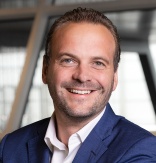Home › magazine › latest news › A.I.S.E. since 1952 the history of a sustainable industry
A.I.S.E. since 1952 - the history of a sustainable industry
14th of August 2023This year A.I.S.E. celebrates the strength of its network and achievements over 70 years of cooperation through the European association. Aisling O’Kane writes for ECJ about the organisation’s history.
In 70 years since its establishment in 1952, A.I.S.E. has grown from a handful of associations collaborating to secure the availability of materials post-war, into a pan-European organisation representing over 900 companies across over 30 markets. A.I.S.E. owes its existence to a few visionary individuals committed to developing trade and free movement in post-war Europe - through an industry organisation that would speak with one common voice for the European soap and detergents industry.
Over the seven decades that followed, the whole process of cleaning and washing has been transformed, in response to people’s habits and expectations. The products themselves are barely recognisable compared to those used just two generations ago, and work that once required many hours and significant ‘elbow grease’ is now achieved in a fraction of the time.
During its early existence A.I.S.E. focuses on rebuilding trade in a post-war environment with many and economic issues. As the decades unfold, so its role expands in line with evolving societal priorities and expectations. All without losing focus on core values such as sustainable cleaning performance, safety and safe use, bringing benefits of hygiene and well-being to citizens and societies, and an innovative and thriving industry.
From securing trade to supporting human and environmental safety
As the association becomes established in the 70s and 80s, so the focus of its work gradually shifts from trade and ingredient availability to safety for humans and the environment. The decades that follow are marked by wide innovation and scientific studies that explore the use of a variety of substances in cleaning and maintenance products.
Always guided by a science and evidence-based approach, A.I.S.E. has taken a lead in introducing a range of voluntary safety initiatives ahead of legislation for both the professional and the consumer market, with guidance on minimising environmental impact, low temperature washing enabled through the innovation of enzymes, the safety of users and professional workers, the sustainable use of products. Highly concentrated products optimise resources from manufacturing to use - delivering huge environmental savings through concentrated products, more efficient use
of resources and transport savings. This is a key strength of the professional cleaning products industry.
These industry-led initiatives will go on to shape EU legislation that will become standards across the sector. The sector pioneers the use of life cycle analysis (LCA) as the basis of all decision making and we begin to consider the impact across the whole value chain and develops groundbreaking projects on human and environmental risk assessment, which predate the EU’s REACH legislation by several years and demonstrates our industry’s determination to tackle difficult challenges and work to manage substances responsibly.
Driving sustainability and circularity
A.I.S.E. is one of the first associations to emphasise the important role of users in taking voluntary action to drive sustainable washing and cleaning. Our sector has always placed significant focus on the sustainability of its products and industry, going beyond its established environmental work to include the broader pillars of sustainability and consider the impact and opportunities the sector can deliver for Europe’s citizens and economy.
A.I.S.E. recognises the importance of cooperation in achieving a truly sustainable European society. Its flagship Charter for Sustainable Cleaning, launched in 2004, is ground-breaking in its scope and ambition, and continues to demonstrate measurable progress towards global objectives such as a carbon neutral Europe in 2050. The Charter sets a clear vision for the sector and reassures policy makers of the industry’s commitment to deliver.
Stakeholder outreach
From its inception A.I.S.E. has been politically engaged, working alongside scientists, policy makers and partners to find solutions to common challenges and shape the regulatory landscape. Currently, much of the key legislation regulating our sector is being overhauled as a part of the European Commission’s Chemicals Strategy for Sustainability (CSS). The most significant shift in chemicals policy in almost 20 years, it includes revision of CLP, REACH and the Detergent Regulation and will set the stage for years to come.
We are honoured to hold a seat at the Commission’s High-Level Roundtable on the implementation of the CSS and support its aim to prioritise human health, the environment and the competitiveness of EU industry.
An added-value network
Our network has expanded steadily over seven decades. It includes corporate members - SMEs and multinational companies, and national associations representing companies of all sizes that are well-connected and active locally. Together with associate members in the value chain, the A.I.S.E. network benefits from valuable insights and added value, also from extensive partnership up and down the value chain for common advocacy on a whole host of relevant topics.
As A.I.S.E. looks ahead to the next 70 years, it can be confident that detergents and cleaning products will continue to play a key role in upholding health and hygiene. Our network of national associations and multinationals will continue to be our greatest asset, operating across the 27 EU markets and beyond. The network provides unrivalled insights into the needs and evolutions within our sector, and A.I.S.E will remain a knowledge hub for hygiene and sustainability in the years to come.










